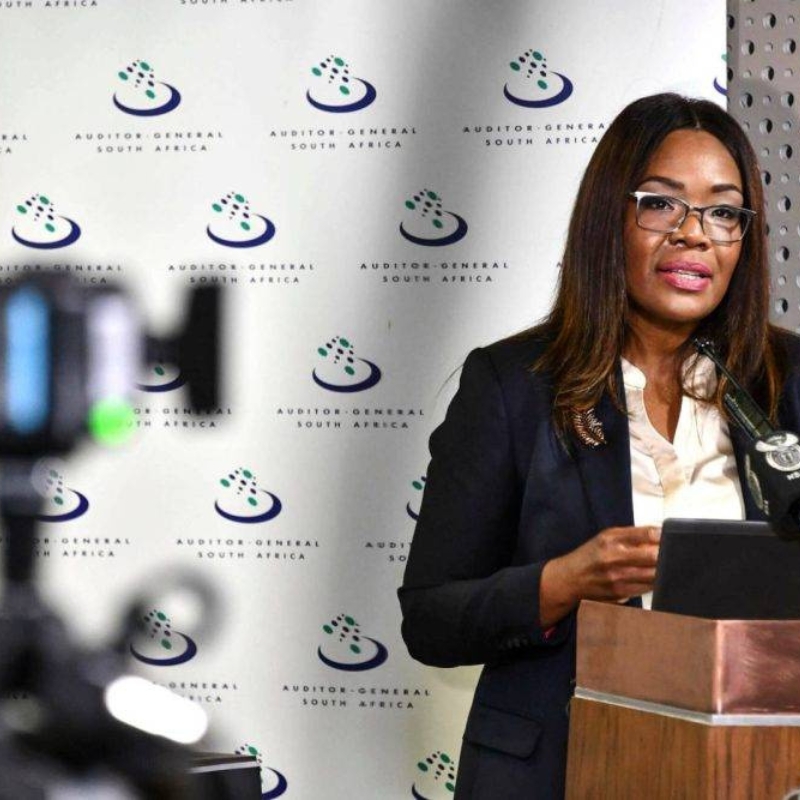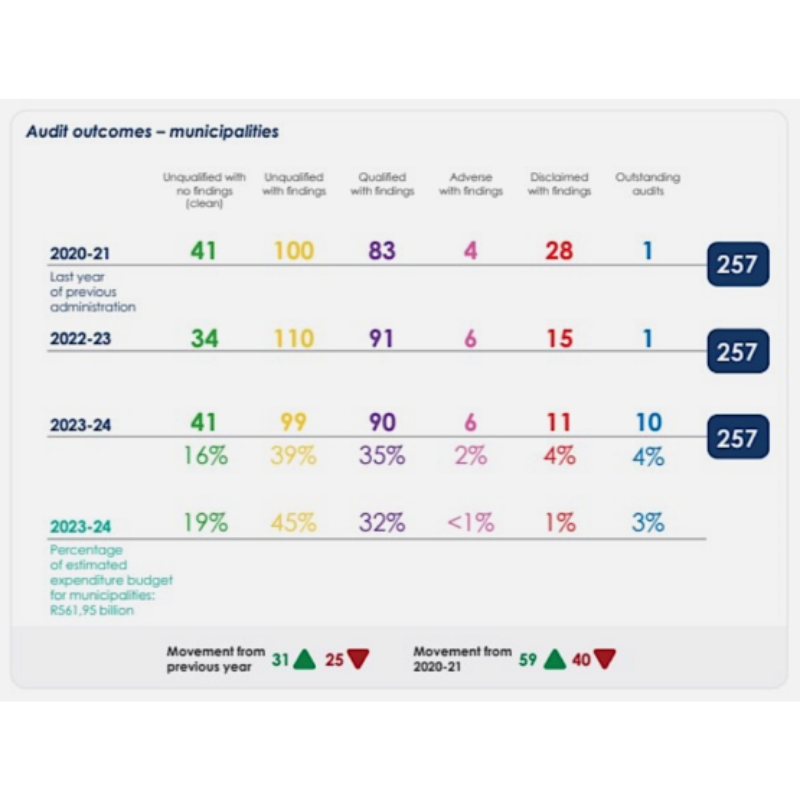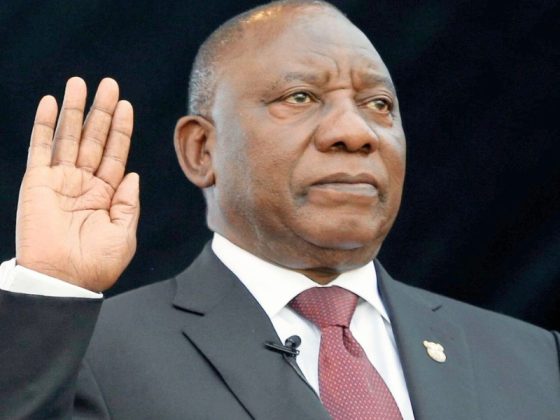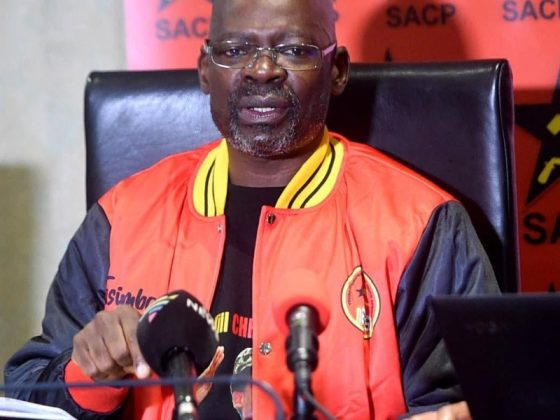
Overview
- On 28 May, Auditor-General Tsakani Maluleke briefed Parliament on the 2023/24 local government audit outcomes – unveiling a grim portrait of entrenched financial mismanagement, eroded institutional capacity, and persistent governance failures.
- The report confirms what many communities already know: service delivery is collapsing, and public trust in local government is fast disappearing.
Audit Outcomes: Stagnation, Not Progress
- Only 41 of 257 municipalities (16%) received clean audits – a figure virtually unchanged since the last term of administration.
- Interestingly, 20 of the 41 municipalities are in the Western Cape.
- While 59 municipalities improved their audit outcomes since 2020/21, 40 regressed, revealing a broader pattern of stagnation rather than systemic progress.
- Of the 29 municipalities with clean audits in both 2020/21 and 2023/24, 25 maintained clean audits consistently – a small circle of administrative islands in a sea of dysfunction.
- Thirteen municipalities failed to submit financial statements and performance reports by the legislated deadline; seven of them repeatedly so, managing a combined budget of R6.85 billion.
- This data shows not just fiscal weakness, but a deep failure to institutionalise good governance practices. The continued presence of material misstatements in 43% of completed audits, mostly in Eastern Cape, Northern Cape, and North West, points to collapsing oversight and ineffective internal controls.

Consultants, But No Capability
- Despite spending R848.85 million on consultants, particularly in Limpopo and North West, many municipalities still failed to produce credible financial statements. The reliance on external support, driven by a shortage of skilled personnel, is proving ineffective and unsustainable.
- The AG’s office also noted that 77 municipalities relied on auditors to correct their own errors, undermining the purpose of independent oversight. This is a symptom of a broken financial ecosystem where municipalities lack both capacity and accountability.
Metros: Bigger Budgets, Bigger Failures
- The City of Cape Town was the only metro to receive a clean audit.
- Johannesburg, Ekurhuleni, and eThekwini received unqualified audits with findings, while Tshwane, Mangaung, Buffalo City, and Nelson Mandela Bay were hit with qualified opinions.
- These metros account for nearly half of all households in the country and 57% of local government spending – but most are falling short.
- Audit outcomes reflect chronic issues in metros:
- Poor revenue management and debt collection;
- Ineffective budgeting;
- R33.29 billion in irregular expenditure since 2021/22;
- Non-compliance with environmental regulations, with several metros lacking valid licences for wastewater and landfill facilities;
- Weak institutional controls and recurring conflicts of interest.
- Tshwane and Mangaung, in particular, have teetered on the edge of operational collapse for four consecutive years, yet little has changed.
The Crisis of Accountability and Alleged Corruption
- Municipalities continue to miss financial reporting deadlines, even with national and provincial support. The AG herself expressed disbelief at how routine this non-compliance has become.
- Vacancy rates in key finance roles remain high: by the end of 2023/24, CFO vacancies affected 20% of municipalities (up from 15%), while finance unit vacancies rose to 19%.
- Alarmingly, in some cases, dysfunction has become institutionalised. For instance, Renosterberg Local Municipality (Northern Cape) has not submitted a performance report in 15 years and lacks a service delivery and budget implementation plan.
- This is not just about weak systems – it is about the absence of political will, internal controls, and credible consequence management.
- There were also allegations of corruption implicating certain auditors in the Free State province, which were raised by ActionSA. However, Maluleke denied those claims. The claims allege that audit reports were intentionally manipulated to hide evidence of extensive financial mismanagement and fraud within the Mangaung Metropolitan Municipality.
- She said audits are subject to stringent internal and external processes to ensure adherence to ethical and auditing standards. She emphasised that AGSA reviewed the entity’s audits and concluded there was no basis for the allegations, as all findings were reported consistently.
What This Means for the 2026 Local Government Elections
A Mirror to Municipal Collapse
- The AG’s report lays bare the rot:
- Unauthorised, Irregular, Fruitless and Wasteful Expenditure (UIFW) spending in the billions;
- Repeated audit regressions;
- Service delivery failures;
- Lack of credible financial reporting.
- For many communities, these are not just statistics; they are daily struggles with water cuts, power failures, broken roads, and uncollected garbage.
Elections as a Referendum on Local Governance
- The 2026 elections will not just be about party politics; they will be a referendum on local performance. Where municipalities are repeat offenders on audit outcomes, voter backlash is likely, especially in more urbanised and media-exposed regions.
- We can expect low voter turnout in disillusioned areas; protest voting; and a rise in independents and issue-based candidates who focus on service delivery.
Coalition Politics Under the Microscope
- Coalitions now govern many municipalities. The AG’s report exposes both:
- The failure of fragile coalitions bogged down by infighting and patronage; and
- The opportunity for functional coalitions or new entrants to use clean audits and improved delivery as campaign leverage.
- Voters may begin demanding results, not rhetoric, from coalition arrangements.
Political Messaging and the Weaponisation of Audit Findings
- Opposition parties will frame the AG’s report as proof of systemic collapse under ruling coalitions. Civic movements will mobilise around the findings to demand deeper reforms and greater local autonomy. Incumbent coalitions may highlight marginal improvements in select municipalities while attempting to downplay the broader crisis.
- But the electorate is increasingly impatient with technical spin. Communities want answers: Where did the money go? Why are we not receiving services?
Rebuilding Trust Requires More Than Spin
- The AG’s findings confirm a hard truth: technical audits have become political documents. They no longer just serve Parliament; they shape the public’s perception of whether the state is functional or failing.
- For political parties, especially ahead of 2026, the bar has shifted. Track records matter more than promises; clean audits and improved governance are campaign assets; and vague reform plans will be ignored unless backed by credible, localised strategies.
- Without visible, sustained change (skilled appointments, transparent procurement, and firm accountability) voters will view audit reports not as isolated warnings, but as confirmation that local government is beyond salvage.
Governance Is the Battleground
- As South Africa heads toward the 2026 local elections, the AG’s 2023/24 report delivers a clear verdict: the local government system is in crisis. Unless tangible reform follows, the political fallout will be real.
- Voters will ask, if the money is there, where are the services? If parties cannot answer that convincingly, the Auditor-General’s report may be the silent force that redraws South Africa’s political map.



